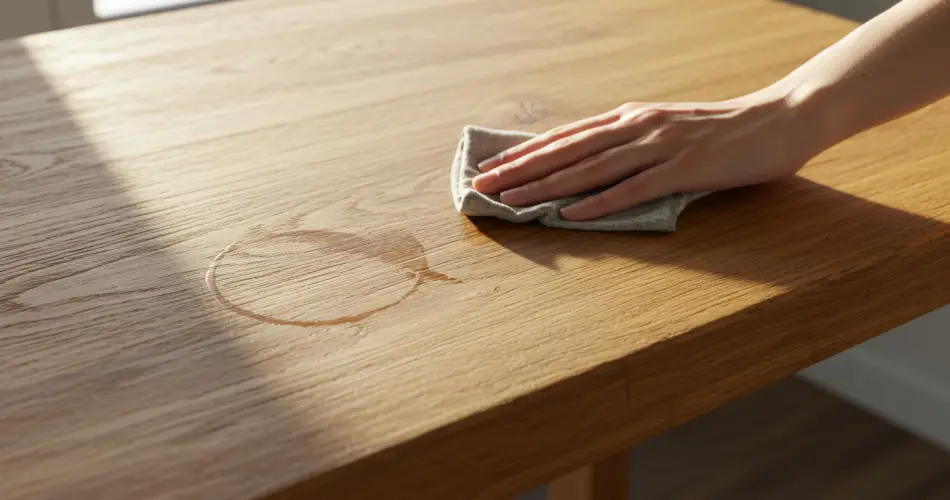Hard water stains are a common nuisance in many households. They can appear on glass, wood, stainless steel, and other surfaces, leaving unsightly marks and making your home look less clean. While commercial cleaners are available, they often contain harsh chemicals that may be harmful to both your health and the environment. Fortunately, there are simple, eco-friendly solutions that are effective and inexpensive. In this article, we’ll explore practical ways to tackle hard water stains naturally, helping your home sparkle without the use of harsh chemicals.
Understanding Hard Water and Its Effects
Before diving into solutions, it’s helpful to understand what causes these stains. Hard water is water that contains high levels of minerals, particularly calcium and magnesium. When this water comes into contact with surfaces, it can leave behind deposits that form stains or a white, chalky film known as limescale. These stains can accumulate over time on windows, bathroom fixtures, kitchen sinks, and even wooden furniture, making cleaning a more challenging task.
Because hard water stains are mineral-based, regular cleaning with water alone is often not enough. That’s why using natural, mildly abrasive, or acidic substances can be especially effective in breaking down these deposits without damaging the underlying surfaces.
Removing Hard Water Stains from Wood
Wooden furniture and surfaces are particularly delicate and require careful cleaning to avoid damage. Hard water stains can appear when a wet glass or cup is placed on a wooden table, or when cleaning with hard water leaves lingering marks.
One of the simplest ways to address minor water stains is to use a hairdryer. Quickly drying the wet area with warm air can help prevent stains from setting in. For persistent marks, an unconventional but surprisingly effective solution is mayonnaise. Applying a small amount of mayonnaise to the stain and letting it sit for a few minutes before gently wiping it away can help lift the mineral deposits. The oils in mayonnaise moisturize the wood while dissolving the minerals, leaving the surface clean and polished.
Cleaning Glass Surfaces
Glass surfaces, including windows, mirrors, and shower doors, often show hard water stains most prominently. A natural and effective solution is white toothpaste. Mixing the toothpaste with warm water creates a foamy solution that can be applied to the stained area. Let it sit for a few minutes, then gently scrub with a soft cloth or sponge. Once rinsed and dried, the glass should appear clear and streak-free.
This method is particularly useful for bathroom and kitchen glass surfaces that are frequently exposed to hard water. Additionally, citrus oils from lemons or oranges can be used to clean and shine glass surfaces. Their natural acidity and degreasing properties help remove stains while leaving a fresh scent behind.
Dealing with Hard Water on Stainless Steel
Stainless steel appliances, sinks, and fixtures can also suffer from hard water stains and dullness. A natural cleaning solution that works well involves mixing baking soda and white vinegar with warm water. This combination creates a mildly abrasive, slightly acidic solution that can effectively dissolve mineral deposits.
Apply the mixture to the stainless steel surface using a microfiber cloth and gently rub the area until the stains are gone. Rinse thoroughly with water and dry with a clean cloth to prevent new water spots from forming. This method not only removes hard water stains but also restores the surface’s natural shine.
Eco-Friendly Tips for Everyday Maintenance
To minimize hard water stains, it’s helpful to adopt preventive measures alongside natural cleaning methods:
-
Dry surfaces promptly: Wiping down sinks, counters, and tables immediately after they get wet reduces the chance for mineral deposits to form.
-
Use soft cloths or microfiber towels: These materials help remove moisture and prevent streaks without scratching surfaces.
-
Apply natural polishers: Lemon juice, olive oil, or mayonnaise can be used periodically to maintain wooden surfaces and restore luster.
-
Regular maintenance: Cleaning glass, stainless steel, and wooden surfaces on a weekly basis can prevent hard water stains from becoming stubborn.
By combining these preventive steps with natural cleaning solutions, you can keep your home free of hard water stains without relying on commercial chemicals.
Why Natural Methods Work
The effectiveness of these natural solutions comes from their chemical properties. Acidic ingredients like lemon juice, vinegar, and certain citrus oils break down mineral deposits, while mildly abrasive substances like toothpaste and baking soda physically remove stubborn stains. Oils, such as those in mayonnaise, help penetrate porous materials like wood, dissolving mineral buildup while conditioning the surface.
Not only are these methods safe and eco-friendly, but they are also budget-friendly, using ingredients you likely already have at home. With a little regular attention, you can keep all surfaces in your home clean, shiny, and free of hard water stains.
Conclusion
Hard water stains don’t have to be a permanent problem in your home. From wood and glass to stainless steel, natural solutions like mayonnaise, toothpaste, citrus oils, baking soda, and vinegar provide safe, effective ways to remove stubborn stains and restore shine. Along with simple preventive measures—like drying surfaces promptly and regular maintenance—these eco-friendly methods offer a sustainable alternative to harsh chemical cleaners.
By understanding the nature of hard water and using the right natural ingredients, you can keep your home looking fresh, clean, and streak-free without compromising your health or the environment. These simple tricks are not only easy to follow but also cost-effective, making them ideal for every household looking to maintain sparkling, stain-free surfaces.



